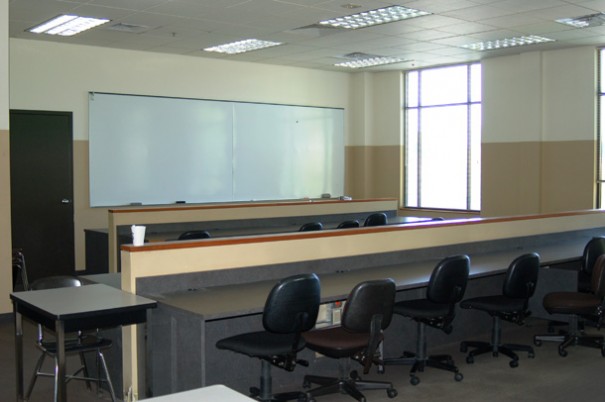This content was published: July 5, 2011. Phone numbers, email addresses, and other information may have changed.
Cascade launches pilot project for Netbook technology
Photos and story by Gina Whitehill-Baziuk
Netbook technology is coming to Cascade Campus as a pilot for creating flexible classroom space in three different subject areas for the growing number of students on campus. This July PCC will begin remodeling two classrooms in Jackson Hall [pdf] (100 and 101) and one in the Student Services Building [pdf] (206). In two of the classrooms, which now serve as computer labs, the College will replace existing hard-wired computer workstations with standard classroom tables and chairs and Netbooks – small, lightweight, inexpensive and wireless laptop computers. The College will also be adding Netbooks in Terrell Hall [pdf] (206). The technology changes pave the way for redesigning classrooms to accommodate more students in a variety of instructional formats. Remodeled classrooms will be ready for students next fall term.

A former computer lab, room 206 in the Student Service Building on Cascade Campus will be remodeled this summer with tables, chairs and Netbooks technology.
Scott Huff, Dean of Instruction for Cascade Campus, helped launch the Netbooks initiative on campus. “One of our goals is to determine if Netbooks work well with different subject areas – science in Jackson Hall, math in Student Services Building, and writing in Terrell Hall,” Huff explains.
Instructors will distribute Netbooks to students when needed, or store them in a locked cart in the classrooms when not in use. Each cart holds 24 laptops and plugs into the wall to recharge batteries for the next class. While the laptops will be primarily used in these four classrooms, instructors may take advantage of the new technology anywhere on campus thanks to their portability.
“The conventional configuration of computer labs usually limits the type of instruction in the classroom to computer-based with no more than 30 students. It also restricts an instructor’s ability to use large or small work groups and different classroom seating arrangements,” said Gary Eaton, Cascade Campus Technology Manager. The new room configurations can accommodate between 24 to 38 students.
Last month PCC removed existing computers, desks and chairs from the classrooms. This summer they will install additional wireless technology and tables and chairs that can be easily moved and reconfigured as needed. According to Eaton, “We usually use wired connections in our classrooms for stability and security. Relying totally on Wi-Fi is a new adventure for us and we want to be sure our wireless infrastructure is as robust as possible.”
“We hope that this trial of using Netbooks in three different subject areas will be a way to move into the future with more flexible and portable computing, and away from hard-wired computers,” said Huff.
Rebecca Ocken, PCC Bond Program Project Manager, is managing the campus-funded project. She, along with campus representatives and the project architects, THA, will be reviewing proposals from two MWESB (minority, women and emerging small business) firms for general contracting later this month. For more information, contact Rebecca Ocken in the PCC Bond Program (971-722-8410).


How will netbooks be secured?
Thanks for your inquiry, Patricia,
The Netbooks will be securely locked on a cart that will be in a locked room. Computers will be set back onto the cart after class. They will be plugged into the chargers and the cart is plugged into the wall. Hope this helps.